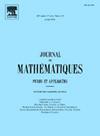Schatten properties of Calderón–Zygmund singular integral commutator on stratified Lie groups
IF 2.1
1区 数学
Q1 MATHEMATICS
引用次数: 0
Abstract
We provide full characterization of the Schatten properties of , the commutator of Calderón–Zygmund singular integral T with symbol b on stratified Lie groups . We show that, when p is larger than the homogeneous dimension of , the Schatten norm of the commutator is equivalent to the Besov semi-norm of the function b; but when , the commutator belongs to if and only if b is a constant. For the endpoint case at the critical index , we further show that the Schatten norm of the commutator is equivalent to the Sobolev norm of b. Our method at the endpoint case differs from existing methods of Fourier transforms or trace formula for Euclidean spaces or Heisenberg groups, respectively, and hence can be applied to various settings beyond.
分层李群上卡尔德龙-齐格蒙奇异积分换元器的沙腾特性
我们提供了分层李群上带有符号的奇异卡尔德龙-齐格蒙积分换元 Ⅳ 的夏顿性质的完整特征。我们证明,当大于 , 的同次元维度时,换元的夏顿规范等价于函数的贝索夫半规范;但当 , 的换元属于且仅属于常数时,换元的夏顿规范等价于函数的贝索夫半规范。对于临界指数 ,我们证明换元的 Schatten norm 等价于函数 .我们针对临界情况的方法不同于现有的傅里叶变换或欧几里得空间或海森堡群的迹公式,因此可以应用于其他各种情况。
本文章由计算机程序翻译,如有差异,请以英文原文为准。
求助全文
约1分钟内获得全文
求助全文
来源期刊
CiteScore
4.30
自引率
0.00%
发文量
84
审稿时长
6 months
期刊介绍:
Published from 1836 by the leading French mathematicians, the Journal des Mathématiques Pures et Appliquées is the second oldest international mathematical journal in the world. It was founded by Joseph Liouville and published continuously by leading French Mathematicians - among the latest: Jean Leray, Jacques-Louis Lions, Paul Malliavin and presently Pierre-Louis Lions.

 求助内容:
求助内容: 应助结果提醒方式:
应助结果提醒方式:


